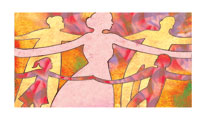Being Jewish
Commentary
Commentary: Sunrise, Sunset

When my son was a newborn, I had imagined myself his custodian in the years ahead, picking up after him, feeding him, buying larger pants year by year. I didn’t imagine him as a separate independent person until, at 4 months old, he rolled over for the first time.
This separateness exhilarated me. He was making his first moves toward uprightness, which would lead him to sitting in a chair and walking, climbing trees and calling down to me from above.
Recently, both my son and daughter, a year apart in age, had their bar and bat mitzva one week apart. This experience again shifted how I saw my role as their mother. According to Jewish tradition, I was no longer guilty for their sins; they were going to make their own choices and take the consequences. They were stepping into the adult community, to be counted on ethically.
Just as my kids once shared a stroller growing up, sometimes reminding me of those Greek masks of comedy and tragedy—she’d be crying, he’d be calm; she’d be laughing, he’d be cranky—they got to share this coming-of-age experience, too.
They formed a bond as they went through the preparation together. They did the Ashrei call and response like a jump rope song. They hit their nervousness the same evening, and we all had to calm down together.
One day, I walked into the house and heard my daughter chanting in her room and my son chanting in the kitchen. They made a kind of harmony without knowing it. I just stood there and felt my throat catch.
Neither has hit puberty yet. (When my son walked over to the synagogue with his father and grandfather on the morning of his bar mitzva, the talis his grandfather brought him from Israel was so long it touched the ground, so his grandfather wore it.)
Although he hasn’t hit his growth spurt yet, my son now walks with more “weight,” as if he takes up more space in the world, feels more substantial. Although she still doesn’t have a woman’s body, my daughter is getting a woman’s carriage. There is a certain grace in the way she holds her shoulders and neck. Their adulthood is like the taste of a familiar spice in a recipe, subtle but clearly there somewhere in the days ahead.
I didn’t count on the emotion I would feel when seeing so clearly what kind of family they are a part of and will be contributing to. Everyone responded to our two invitations saying, “We would love to come to both!” From Toronto, my Uncle Walter, who is on dialysis, said he would make it along with my cousin Jonathan and his wife, who brought the new baby I hadn’t yet met.
Choosing people to honor made me think of how many people I love in my life—twice. And hearing that ancient phrasing of their names as “son of” and “daughter of” inspired me with a dignity one doesn’t feel every day, reminding me that I am inextricably linked to the generation before.
After the beautiful day of my son’s bar mitzva, my stepfather, who had been unable to travel, became very ill; on the evening of my daughter’s bat mitzva, he called to say goodbye. He died the next day. My mother had the rare experience of seeing my daughter step up to the bima and then fly home in time to help her husband die.
She said the first event got her through the second. She saw that the next generation is ready to stand up and be counted.









 Facebook
Facebook Instagram
Instagram Twitter
Twitter
Leave a Reply